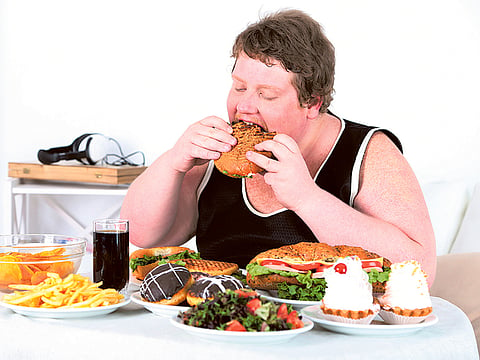More and more young people suffer from binge eating
Greater attention should be paid towards treating eating disorders, experts say

Abu Dhabi: Taking into consideration the high rates of obesity in the UAE, greater attention should be paid towards treating eating disorders, especially as more and more people are suffering from it at a younger age, experts said on Monday.
In fact, patients as young as 11 years old are indulged in binge eating, the most common eating disorder in the UAE, Hala Abu Taha, clinical dietitian and eating disorder specialist, told Gulf News.
“These patients mostly develop a very unhealthy relationship with food, linking eating with happiness, and end up becoming obese. By the time they approach us for treatment, it is very difficult to reverse these habits,” Abu Taha said.
The UAE has one of the highest rates of obesity in the world, and a study by the University of Washington Institute for Health Metrics and Evaluation found that about 60 per cent of adults are obese. The World Health Organisation reported that more than 36 per cent of children in the country suffer from obesity.
To tackle bingeing and other eating-related conditions, the American Centre for Psychiatry and Neurology has started free screenings across its facilities in Abu Dhabi, Dubai and Sharjah. During these screenings, which will continue till March 15, participants will be given a questionnaire to determine if they are suffering from possible eating disorders.
The three-week campaign coincides with the United States’ National Eating Disorders Awareness Week.
We want to create an awareness about eating disorders as some people remain unaware that they are suffering from it, Abu Taha said.
Patients suffering from binge eating disorder regularly starve themselves and end up eating double the amount of food what they have been eating as a healthy individual. Many other enjoy eating so much that they do not want any treatment.
A 2016 study by a professor at the American University of Sharjah found that about one-third of the 254 respondents had moderate to severe binge eating disorder, and that people suffering from the condition used eating as a means of dealing with negative emotions.
“A 32-year-old patient of mine consumes 4 big bags of crisps, 20 chocolates and three litres of soft drinks at a time, and he considers it to be normal. Another female patient regularly eats 24 hot dogs, 20 nuggets and fries in addition to soft drinks,” Abu Taha said.
The campaign by the American Centre for Psychiatry and Neurology, which launched its Eating Disorders Unit last December, aims to create awareness about eating-related problems.
“We see a fair number of patients with bigorexia, a body dysmorphic disorder in which the patient thinks he or she is not muscular enough. The majority of these patients are young Emirati males, and they mostly end up taking harmful steroids in a bid to become more muscular,” Abu Taha said.
Another disorder involves extreme pickiness when it comes to food, known as avoidant restrictive food intake disorder. “Under this condition, an incident makes a person very selective about the food they eat. One of my patients, an 11-year-old boy, had been consuming only formula milk for about four months. But after treatment he is much better now,” Abu Taha said.
“Essentially, we want people to understand that help is available, and that they can overcome their problems regarding the unhealthy eating,” she added.


